| Listing 1 - 10 of 17 | << page >> |
Sort by
|
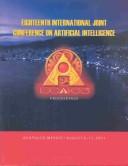
ISBN: 0127056610 9780127056616 Year: 2003 Publisher: Los Altos Kaufmann
Abstract | Keywords | Export | Availability | Bookmark
 Loading...
Loading...Choose an application
- Reference Manager
- EndNote
- RefWorks (Direct export to RefWorks)
681.3*I26 <063> --- 681.3*F3 <063> --- 681.3*I29 <063> --- Learning: analogies; concept learning; induction; knowledge acquisition; language acquisition; parameter learning (Artificial intelligence)--See also {681.3*K32}--Congressen --- Logics and meanings of programs (Theory of computation)--Congressen --- Robotics: manipulators; propelling mechanisms; sensors (Artificial intelligence)--Congressen --- 681.3*I26 <063> Learning: analogies; concept learning; induction; knowledge acquisition; language acquisition; parameter learning (Artificial intelligence)--See also {681.3*K32}--Congressen
Book
Abstract | Keywords | Export | Availability | Bookmark
 Loading...
Loading...Choose an application
- Reference Manager
- EndNote
- RefWorks (Direct export to RefWorks)
681.3*I2 <063> --- 681.3*I26 <063> --- Artificial intelligence. AI--Congressen --- Learning: analogies; concept learning; induction; knowledge acquisition; language acquisition; parameter learning (Artificial intelligence)--See also {681.3*K32}--Congressen --- Conferences - Meetings --- Engineering & Applied Sciences --- Computer Science --- 681.3*I26 <063> Learning: analogies; concept learning; induction; knowledge acquisition; language acquisition; parameter learning (Artificial intelligence)--See also {681.3*K32}--Congressen --- 681.3*I2 <063> Artificial intelligence. AI--Congressen --- Information Technology --- Computer Science (Hardware & Networks)
Book
ISBN: 1581138385 Year: 2004 Publisher: S.l. ACM
Abstract | Keywords | Export | Availability | Bookmark
 Loading...
Loading...Choose an application
- Reference Manager
- EndNote
- RefWorks (Direct export to RefWorks)
681.3*I2 --- 681.3*I26 <063> --- 681.3*I2 Artificial intelligence. AI --- Artificial intelligence. AI --- 681.3*I26 <063> Learning: analogies; concept learning; induction; knowledge acquisition; language acquisition; parameter learning (Artificial intelligence)--See also {681.3*K32}--Congressen --- Learning: analogies; concept learning; induction; knowledge acquisition; language acquisition; parameter learning (Artificial intelligence)--See also {681.3*K32}--Congressen --- Conferences - Meetings --- Information Technology --- Computer Science (Hardware & Networks)
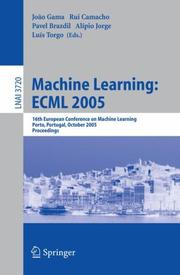
ISSN: 03029743 ISBN: 9783540292432 3540292438 3540316922 Year: 2005 Volume: 3720 Publisher: Berlin New York : Springer,
Abstract | Keywords | Export | Availability | Bookmark
 Loading...
Loading...Choose an application
- Reference Manager
- EndNote
- RefWorks (Direct export to RefWorks)
The European Conference on Machine Learning (ECML) and the European Conference on Principles and Practice of Knowledge Discovery in Databases (PKDD) were jointly organized this year for the ?fth time in a row, after some years of mutual independence before. After Freiburg (2001), Helsinki (2002), Cavtat (2003) and Pisa (2004), Porto received the 16th edition of ECML and the 9th PKDD in October 3–7. Having the two conferences together seems to be working well: 585 di?erent paper submissions were received for both events, which maintains the high s- mission standard of last year. Of these, 335 were submitted to ECML only, 220 to PKDD only and 30 to both. Such a high volume of scienti?c work required a tremendous e?ort from Area Chairs, Program Committee members and some additional reviewers. On average, PC members had 10 papers to evaluate, and Area Chairs had 25 papers to decide upon. We managed to have 3 highly qua- ?edindependentreviewsperpaper(withveryfewexceptions)andoneadditional overall input from one of the Area Chairs. After the authors’ responses and the online discussions for many of the papers, we arrived at the ?nal selection of 40 regular papers for ECML and 35 for PKDD. Besides these, 32 others were accepted as short papers for ECML and 35 for PKDD. This represents a joint acceptance rate of around 13% for regular papers and 25% overall. We thank all involved for all the e?ort with reviewing and selection of papers. Besidesthecoretechnicalprogram,ECMLandPKDDhad6invitedspeakers, 10 workshops, 8 tutorials and a Knowledge Discovery Challenge.
Machine learning --- 681.3*F22 <063> --- 681.3*F41 <063> --- 681.3*H28 <063> --- 681.3*I2 <063> --- 681.3*I26 <063> --- 681.3*I2 <063> Artificial intelligence. AI--Congressen --- Artificial intelligence. AI--Congressen --- 681.3*I26 <063> Learning: analogies; concept learning; induction; knowledge acquisition; language acquisition; parameter learning (Artificial intelligence)--See also {681.3*K32}--Congressen --- Learning: analogies; concept learning; induction; knowledge acquisition; language acquisition; parameter learning (Artificial intelligence)--See also {681.3*K32}--Congressen --- Nonnumerical algorithms and problems: complexity of proof procedures; computations on discrete structures; geometrical problems and computations; pattern matching --See also {?681.3*E2-5}; {681.3*G2}; {?681.3*H2-3}--Congressen --- Mathematical logic: computability theory; computational logic; lambda calculus; logic programming; mechanical theorem proving; model theory; proof theory;recursive function theory--See also {681.3*F11}; {681.3*I22}; {681.3*I23}--Congressen --- Database applications--Congressen --- Conferences - Meetings --- Information Technology --- Artificial Intelligence --- Machine learning - Congresses
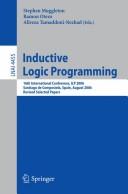
ISBN: 9783540738466 3540738460 3540738479 Year: 2007 Publisher: Berlin, Germany ; New York, United States : Springer,
Abstract | Keywords | Export | Availability | Bookmark
 Loading...
Loading...Choose an application
- Reference Manager
- EndNote
- RefWorks (Direct export to RefWorks)
The inherent dangers of change are often summed up in the misquoted Chinese curse “May you live in interesting times.” The submission procedure for the 16th International Conference of Inductive Logic Programming (ILP 2006) was a radical (hopefully interesting but not cursed) departure from previous years. Submissions were requested in two phases. The ?rst phase involved submission of short papers (three pages) which were then presented at the conference and included in a short papers proceedings. In the second phase, reviewers selected papersforlongpapersubmission(15pagesmaximum).Thesewerethenassessed by the same reviewers, who then decided which papers to include in the journal special issue and proceedings. In the ?rst phase there were a record 77 papers, comparedto the usual20 orso long papersofpreviousyears.Eachpaper was- viewed by three reviewers. Out of these, 71 contributors were invited to submit long papers. Out of the long paper submissions, 7 were selected for the - chine Learning Journal special issue and 27 were accepted for the proceedings. In addition, two papers were nominated by Program Committee referees for the applications prize and two for the theory prize. The papers represent the div- sity and vitality in present ILP research including ILP theory, implementations, search and phase transition, distributed and large-scale learning, probabilistic ILP, biological applications, natural language learning and planning and action learning.
681.3*D16 <063> --- Logic programming --- 681.3*I26 <063> --- 681.3*I25 <063> --- 681.3*I25 <063> Programming languages and software: expert system tools and techniques (Artificial intelligence)--See also {681.3*D32}--Congressen --- Programming languages and software: expert system tools and techniques (Artificial intelligence)--See also {681.3*D32}--Congressen --- 681.3*I26 <063> Learning: analogies concept learning induction knowledge acquisition language acquisition parameter learning (Artificial intelligence)--See also {681.3*K32}--Congressen --- Learning: analogies concept learning induction knowledge acquisition language acquisition parameter learning (Artificial intelligence)--See also {681.3*K32}--Congressen --- Computer programming --- Programming techniques: Logic programming--Congressen --- Conferences - Meetings --- Automatic hypothesis formation --- Génération automatique d'hypothèses --- Computer science. --- Software engineering. --- Computer programming. --- Algorithms. --- Mathematical logic. --- Artificial intelligence. --- Computer Science. --- Software Engineering/Programming and Operating Systems. --- Artificial Intelligence (incl. Robotics). --- Programming Techniques. --- Mathematical Logic and Formal Languages. --- Algorithm Analysis and Problem Complexity. --- AI (Artificial intelligence) --- Artificial thinking --- Electronic brains --- Intellectronics --- Intelligence, Artificial --- Intelligent machines --- Machine intelligence --- Thinking, Artificial --- Bionics --- Cognitive science --- Digital computer simulation --- Electronic data processing --- Logic machines --- Machine theory --- Self-organizing systems --- Simulation methods --- Fifth generation computers --- Neural computers --- Algebra of logic --- Logic, Universal --- Mathematical logic --- Symbolic and mathematical logic --- Symbolic logic --- Mathematics --- Algebra, Abstract --- Metamathematics --- Set theory --- Syllogism --- Algorism --- Algebra --- Arithmetic --- Computers --- Electronic computer programming --- Electronic digital computers --- Programming (Electronic computers) --- Coding theory --- Computer software engineering --- Engineering --- Informatics --- Science --- Foundations --- Programming --- 681.3*I26 <063> Learning: analogies; concept learning; induction; knowledge acquisition; language acquisition; parameter learning (Artificial intelligence)--See also {681.3*K32}--Congressen --- Learning: analogies; concept learning; induction; knowledge acquisition; language acquisition; parameter learning (Artificial intelligence)--See also {681.3*K32}--Congressen --- Information Technology --- Artificial Intelligence --- Computer software. --- Artificial Intelligence. --- Software, Computer --- Computer systems
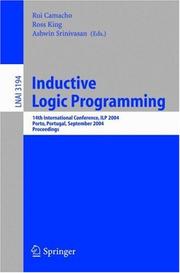
ISBN: 3540229418 3540301097 Year: 2004 Publisher: Berlin, Heidelberg : Springer Berlin Heidelberg : Imprint: Springer,
Abstract | Keywords | Export | Availability | Bookmark
 Loading...
Loading...Choose an application
- Reference Manager
- EndNote
- RefWorks (Direct export to RefWorks)
“How often we recall, with regret”, wrote Mark Twain about editors, “that Napoleon once shot at a magazine editor and missed him and killed a publisher. But we remember with charity, that his intentions were good. ” Fortunately, we live in more forgiving times, and are openly able to express our pleasure at being the editors of this volume containing the papers selected for presentation at the 14th International Conference on Inductive Logic Programming. ILP 2004 was held in Porto from the 6th to the 8th of September, under the auspices of the Department of Electrical Engineering and Computing of the Faculty of Engineering of the University of Porto (FEUP), and the Laborat´ orio de Inteligˆ encia Arti?cial e Ciˆ encias da Computa¸ c˜ ao (LIACC). This annual me- ing of ILP practitioners and curious outsiders is intended to act as the premier forum for presenting the most recent and exciting work in the ?eld. Six invited talks—three from ?elds outside ILP, but nevertheless highly relevant to it— and 20 full presentations formed the nucleus of the conference. It is the full-length papersofthese20presentationsthatcomprisethebulkofthisvolume. Asisnow common with the ILP conference, presentations made to a “Work-in-Progress” track will, hopefully, be available elsewhere. We gratefully acknowledge the continued support of Kluwer Academic P- lishers for the “Best Student Paper” award on behalf of the Machine Lea- ing journal; and Springer-Verlag for continuing to publish the proceedings of these conferences.
681.3*D16 --- Logic programming --- 681.3*I26 <063> --- 681.3*I25 <063> --- 681.3*I23 <063> --- 681.3*F1 --- 681.3*I2 --- 681.3*I2 Artificial intelligence. AI --- Artificial intelligence. AI --- 681.3*F1 Computation by abstract devices --- Computation by abstract devices --- Computer programming --- 681.3*I23 <063> Deduction and theorem proving: answer/reason extraction reasoning resolution metatheory mathematical induction logic programming (Artificial intelligence)--Congressen --- Deduction and theorem proving: answer/reason extraction reasoning resolution metatheory mathematical induction logic programming (Artificial intelligence)--Congressen --- 681.3*I25 <063> Programming languages and software: expert system tools and techniques (Artificial intelligence)--See also {681.3*D32}--Congressen --- Programming languages and software: expert system tools and techniques (Artificial intelligence)--See also {681.3*D32}--Congressen --- 681.3*I26 <063> Learning: analogies concept learning induction knowledge acquisition language acquisition parameter learning (Artificial intelligence)--See also {681.3*K32}--Congressen --- Learning: analogies concept learning induction knowledge acquisition language acquisition parameter learning (Artificial intelligence)--See also {681.3*K32}--Congressen --- Computerwetenschap--?*D16 --- Computer science. --- Software engineering. --- Computer programming. --- Mathematical logic. --- Artificial intelligence. --- Computer Science. --- Software Engineering/Programming and Operating Systems. --- Artificial Intelligence (incl. Robotics). --- Programming Techniques. --- Mathematical Logic and Formal Languages. --- 681.3*I23 <063> Deduction and theorem proving: answer/reason extraction; reasoning; resolution; metatheory; mathematical induction; logic programming (Artificial intelligence)--Congressen --- Deduction and theorem proving: answer/reason extraction; reasoning; resolution; metatheory; mathematical induction; logic programming (Artificial intelligence)--Congressen --- 681.3*I26 <063> Learning: analogies; concept learning; induction; knowledge acquisition; language acquisition; parameter learning (Artificial intelligence)--See also {681.3*K32}--Congressen --- Learning: analogies; concept learning; induction; knowledge acquisition; language acquisition; parameter learning (Artificial intelligence)--See also {681.3*K32}--Congressen --- AI (Artificial intelligence) --- Artificial thinking --- Electronic brains --- Intellectronics --- Intelligence, Artificial --- Intelligent machines --- Machine intelligence --- Thinking, Artificial --- Bionics --- Cognitive science --- Digital computer simulation --- Electronic data processing --- Logic machines --- Machine theory --- Self-organizing systems --- Simulation methods --- Fifth generation computers --- Neural computers --- Algebra of logic --- Logic, Universal --- Mathematical logic --- Symbolic and mathematical logic --- Symbolic logic --- Mathematics --- Algebra, Abstract --- Metamathematics --- Set theory --- Syllogism --- Computers --- Electronic computer programming --- Electronic digital computers --- Programming (Electronic computers) --- Coding theory --- Computer software engineering --- Engineering --- Informatics --- Science --- Programming --- Artificial Intelligence.
Book
ISBN: 3540879870 3540879862 Year: 2008 Publisher: Berlin ; Heidelberg : Springer,
Abstract | Keywords | Export | Availability | Bookmark
 Loading...
Loading...Choose an application
- Reference Manager
- EndNote
- RefWorks (Direct export to RefWorks)
This book constitutes the refereed proceedings of the 19th International Conference on Algorithmic Learning Theory, ALT 2008, held in Budapest, Hungary, in October 2008, co-located with the 11th International Conference on Discovery Science, DS 2008. The 31 revised full papers presented together with the abstracts of 5 invited talks were carefully reviewed and selected from 46 submissions. The papers are dedicated to the theoretical foundations of machine learning; they address topics such as statistical learning; probability and stochastic processes; boosting and experts; active and query learning; and inductive inference.
Computer algorithms --- Machine learning --- Information Technology --- Artificial Intelligence --- 681.3*F4 <063> --- 681.3*I26 <063> --- 681.3*I7 <063> --- 681.3*K3 <063> --- 681.3*I26 <063> Learning: analogies; concept learning; induction; knowledge acquisition; language acquisition; parameter learning (Artificial intelligence)--See also {681.3*K32}--Congressen --- Learning: analogies; concept learning; induction; knowledge acquisition; language acquisition; parameter learning (Artificial intelligence)--See also {681.3*K32}--Congressen --- Mathematical logic and formal languages (Theory of computation)--Congressen --- Text processing (Computing methodologies)--See also {681.3*H4}--Congressen --- Computers and education--Congressen --- Data mining. --- Artificial intelligence. --- Natural language processing (Computer science). --- Information systems. --- Data Mining and Knowledge Discovery. --- Artificial Intelligence. --- Natural Language Processing (NLP). --- Computer Appl. in Arts and Humanities. --- NLP (Computer science) --- Artificial intelligence --- Electronic data processing --- Human-computer interaction --- Semantic computing --- AI (Artificial intelligence) --- Artificial thinking --- Electronic brains --- Intellectronics --- Intelligence, Artificial --- Intelligent machines --- Machine intelligence --- Thinking, Artificial --- Bionics --- Cognitive science --- Digital computer simulation --- Logic machines --- Machine theory --- Self-organizing systems --- Simulation methods --- Fifth generation computers --- Neural computers --- Algorithmic knowledge discovery --- Factual data analysis --- KDD (Information retrieval) --- Knowledge discovery in data --- Knowledge discovery in databases --- Mining, Data --- Database searching --- Application software. --- Application computer programs --- Application computer software --- Applications software --- Apps (Computer software) --- Computer software
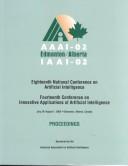
ISBN: 0262511290 Year: 2002 Publisher: [Place of publication not identified] MIT Press
Abstract | Keywords | Export | Availability | Bookmark
 Loading...
Loading...Choose an application
- Reference Manager
- EndNote
- RefWorks (Direct export to RefWorks)
681.3*I23 <063> --- 681.3*I24 <063> --- 681.3*I26 <063> --- 681.3*I27 <063> --- 681.3*D16 <063> --- 681.3*I2m --- Deduction and theorem proving: answer/reason extraction; reasoning; resolution; metatheory; mathematical induction; logic programming (Artificial intelligence)--Congressen --- Knowledge representation formalisms and methods: frames and scripts; predicate logic; relation systems; representation languages; procedural and rule-based representations; semantic networks (Artificial intelligence)--Congressen --- Learning: analogies; concept learning; induction; knowledge acquisition; language acquisition; parameter learning (Artificial intelligence)--See also {681.3*K32}--Congressen --- Natural language processing: language generation; language models; language parsing and understanding; machine translation; speech recognition and under-standing; text analysis (Artificial intelligence)--Congressen --- Programming techniques: Logic programming--Congressen --- Artificial intelligence. AI --- Information Technology --- Computer Science (Hardware & Networks) --- 681.3*I2m Artificial intelligence. AI --- 681.3*I26 <063> Learning: analogies; concept learning; induction; knowledge acquisition; language acquisition; parameter learning (Artificial intelligence)--See also {681.3*K32}--Congressen --- 681.3*I24 <063> Knowledge representation formalisms and methods: frames and scripts; predicate logic; relation systems; representation languages; procedural and rule-based representations; semantic networks (Artificial intelligence)--Congressen --- 681.3*I23 <063> Deduction and theorem proving: answer/reason extraction; reasoning; resolution; metatheory; mathematical induction; logic programming (Artificial intelligence)--Congressen
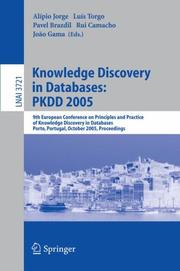
ISBN: 9783540292449 3540292446 3540316655 Year: 2005 Publisher: Berlin Springer
Abstract | Keywords | Export | Availability | Bookmark
 Loading...
Loading...Choose an application
- Reference Manager
- EndNote
- RefWorks (Direct export to RefWorks)
Data mining --- Database searching --- Information Technology --- Artificial Intelligence --- 681.3*F41 <063> --- 681.3*F42 <063> --- 681.3*G3 <063> --- 681.3*H2 <063> --- 681.3*H3 <063> --- 681.3*I26 <063> --- 681.3*I7 <063> --- 681.3*J2 <063> --- 681.3*J2 <063> Physical sciences and engineering (Computer applications)--Congressen --- Physical sciences and engineering (Computer applications)--Congressen --- 681.3*I26 <063> Learning: analogies; concept learning; induction; knowledge acquisition; language acquisition; parameter learning (Artificial intelligence)--See also {681.3*K32}--Congressen --- Learning: analogies; concept learning; induction; knowledge acquisition; language acquisition; parameter learning (Artificial intelligence)--See also {681.3*K32}--Congressen --- Mathematical logic: computability theory; computational logic; lambda calculus; logic programming; mechanical theorem proving; model theory; proof theory;recursive function theory--See also {681.3*F11}; {681.3*I22}; {681.3*I23}--Congressen --- Grammars and other rewriting systems: decision problems; grammar types; parallel rewriting systems; parsing; thue systems (Mathematical logic and formal languages)--See also {681.3*D31}--Congressen --- Probability and statistics: probabilistic algorithms (including Monte Carlo);random number generation; statistical computing; statistical software (Mathematics of computing)--Congressen --- Database management: security; integrity; protection--See also {?681.5*E5}--Congressen --- Information storage and retrieval--Congressen --- Text processing (Computing methodologies)--See also {681.3*H4}--Congressen
Book
ISBN: 9783642118142 9783642118159 9783642118135 Year: 2010 Publisher: Berlin Heidelberg Springer Berlin Heidelberg
Abstract | Keywords | Export | Availability | Bookmark
 Loading...
Loading...Choose an application
- Reference Manager
- EndNote
- RefWorks (Direct export to RefWorks)
ThisbookpresentsselectedandrevisedpapersoftheSecondWorkshoponAd- tive and Learning Agents 2009 (ALA-09), held at the AAMAS 2009 conference in Budapest, Hungary, May 12. The goalof ALA is to provide an interdisciplinaryforum for scientists from a variety of ?elds such as computer science, biology, game theory and economics. This year's edition of ALA was the second after the merger of the former wo- shops ALAMAS and ALAg. In 2008 this joint workshop was organized for the ?rst time under the ?ag of both events. ALAMAS was a yearly returning Eu- pean workshop on adaptive and learning agents and multi-agent systems (held eight times). ALAg was the international workshop on adaptive and learning agents, which was usually held at AAMAS. To increase the strength, visibility and quality of the workshop it was decided to merge both workshops under the ?ag of ALA and to set up a Steering Committee as an organizational backbone. This book contains six papers presented during the workshop, which were carefully selected after an additional review round in the summer of 2009. We therefore wish to explicitly thank the members of the Program Committee for the quality and sincerity of their e?orts and service. Furthermore we would like to thank all the members of the senior Steering Committee for making this workshop possible and supporting it with sound advice. We also thank the AAMAS conference for providing us a platform for holding this event. Finally we also wish to thank all authors who responded to our call-for-papers with interesting contributions.
Complex analysis --- Discrete mathematics --- Mathematics --- Computer science --- Computer architecture. Operating systems --- Artificial intelligence. Robotics. Simulation. Graphics --- Computer. Automation --- discrete wiskunde --- complexe analyse (wiskunde) --- vormgeving --- computers --- informatica --- computerbesturingssystemen --- mineralen (chemie) --- simulaties --- externe fixatie (geneeskunde --- mijnbouw --- algoritmen --- KI (kunstmatige intelligentie) --- OS (operating system) --- computernetwerken --- 681.3*I26 <063> --- 681.3*D2 <063> --- 681.3*K2 --- 681.3*I6 --- 681.3*I6 Simulation and modeling (Computing methodologies)--See also {681.3*G3} --- Simulation and modeling (Computing methodologies)--See also {681.3*G3} --- 681.3*K2 History of computing: hardware; people; software; systems; theory --- History of computing: hardware; people; software; systems; theory --- 681.3*D2 <063> Software engineering: protection mechanisms; standards--See also {681.3*K63}; {681.3*K51}--Congressen --- Software engineering: protection mechanisms; standards--See also {681.3*K63}; {681.3*K51}--Congressen --- 681.3*I26 <063> Learning: analogies; concept learning; induction; knowledge acquisition; language acquisition; parameter learning (Artificial intelligence)--See also {681.3*K32}--Congressen --- Learning: analogies; concept learning; induction; knowledge acquisition; language acquisition; parameter learning (Artificial intelligence)--See also {681.3*K32}--Congressen
| Listing 1 - 10 of 17 | << page >> |
Sort by
|

 Search
Search Feedback
Feedback About
About Help
Help News
News